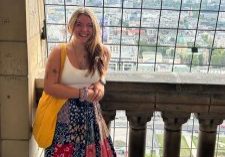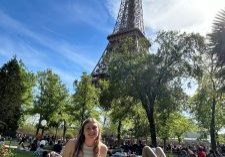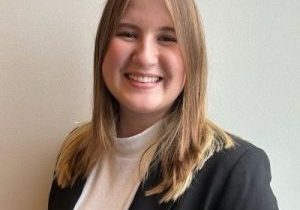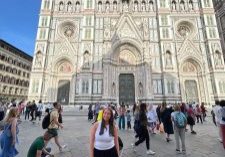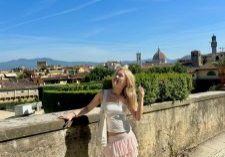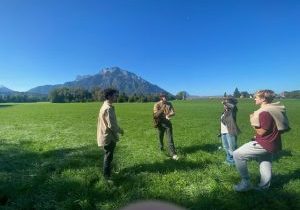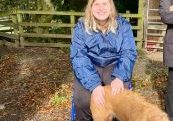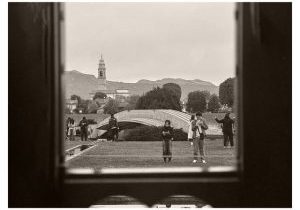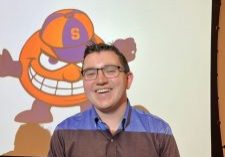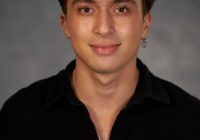
….you should consider the Fulbright U.S. Student Program! Fulbright sends U.S. students abroad to over 140 countries to teach English, do research, and foster mutual understanding between the US and host countries. Students from all levels, come learn more about the Fulbright Program on Friday at the Center for Fellowship & Scholarship Advising (CFSA)’s Fellowship Focus on Fulbright, this Friday, Jan. 30th, 12:30-1:30 PM in Shaffer Art Building, Room 205. More information is here: http://nationalscholarships.syr.edu/?event=fellowship-focus-fulbright-and-other-international-opportunities
Want to read more about SU students’ experiences with the Fulbright? Check out these interviews, which were featured in the SU Magazine summer 2014 article “Winning Support” by Amy Speach: http://sumagazine.syr.edu/2014summer/features/winningsupport.html Stephanie Claytor is a journalist and Honors alum who went to Colombia with her Fulbright and Jennifer Lee Nieves-Alvarez taught English in South Korea

Fulbright English Teaching Assistantship Scholar
Stephanie Claytor ’10 is a Newhouse and College of Arts and Sciences/Maxwell School alumna who is a multimedia journalist at KTAL, the NBC affiliate in Shreveport, Louisiana. She received a 2010 Fulbright English Teaching Assistantship (ETA) to live and work in Colombia.
What did it mean to you to receive the Fulbright ETA?
It meant the world to me. At the time, I knew I did not want to enter the workforce, and instead wanted to travel and explore the world. After studying in the Dominican Republic in 2008, I felt I had some unfinished business in Latin America. I was fascinated with it and wanted to live abroad for a year instead of just a semester. So to receive that opportunity was phenomenal. While there, I was surrounded by many intellectuals, Colombians and Americans. Many of them I am still friends with today. I say now it was the best job ever.
What did you do in Colombia?
I worked at La Universidad de la Sabana, where I led English conversation classes, taught an intermediate English class, tutored master’s students, proctored exams, and ran an English radio show. In my spare time I blogged in Spanish for “Afrocolombianidad,” a blog hosted by the leading newspaper in Bogota. I also gave black history presentations around the country on behalf of the U.S. Embassy. My side project was creating videos about Afro-Colombian culture.
What mentors or experiences at SU were especially helpful to you?
While studying at Syracuse, I had many experiences and influential people enter my life that led me to securing a Fulbright. My first roommate was Dominican. She helped me with my Spanish. I was a member of the Raices Dance Troupe, an experience that helped me learn various types of Latin dances, a huge asset in Colombia. I studied abroad in the Dominican Republic. My host sister introduced me to the Fulbright program because she was applying for one to go to the United States. She also wrote my recommendation letter. While taking the Afro-Latin America class at Syracuse, my professor enlightened me about Colombia’s black population. A combination of these experiences inspired me to apply for a Fulbright.
How did your experience contribute to your career goals?
Being a Fulbright alum helped me become fluent in Spanish. While living there, I dreamed and thought in Spanish. My Spanish-speaking abilities have been an enormous asset in my ability to get television reporter jobs. Also, since I was teaching English, it made me more cognizant of my own English speaking habits and helped me polish my English.

Fulbright English Teaching Assistantship Scholar
Jennifer-Lee Nieves Álvarez ’13, a College of Arts and Sciences/Maxwell School graduate who begins master’s degree studies at the Maxwell School in the fall, received a Fulbright English Teaching Assistantship (ETA) to live and work in South Korea this past academic year. The Fulbright ETA is an aspect of the Fulbright U.S. Student Program, which provides grants for individually designed study and research projects abroad and facilitates international cultural exchange.
Why was the Fulbright ETA a good fit for you?
As an international relations major, I have always been interested in other languages and cross-cultural exchange. In 2012, I visited Korea as part of an exchange program between the U.S. Congress and the Korean National Assembly and learned about U.S.-Korea foreign relations and Korean politics and culture. The Fulbright ETA gave me the opportunity to return to Korea to share my own culture and immerse myself in the Korean culture while living with a host family, teaching at an elementary school, studying the language, and volunteering as a tutor.
Describe a memorable time during your stay in South Korea.
One memory that stands out was the first time I met North Korean defectors at a Hana Center [government resettlement center] where Fulbright ETAs tutor. We ate one of my favorite dishes, bibimbap, a mix of rice, vegetables, and meat. Although there was a language barrier—my knowledge of Korean was very basic and the students didn’t speak any English—through simple Korean sentences we were able to talk about Korean pop culture, their favorite singers, actors, and dramas. Often foreigners and even South Koreans have an idea of how North Koreans should look or behave; however, through our conversation—and after months of tutoring them and even celebrating Christmas together—I learned they are like any other teenagers or young adults.
What did you do for fun and relaxation?
I traveled whenever I had the opportunity. I visited many cities in Korea, attended festivals, such as the Busan International Film Festival, and traveled abroad in the region. Since coffee culture is big in Korea, I liked to go to a café and have some green tea or enjoy the sunny weather while eating patbingsu, Korean shaved ice with red beans and fruits. Koreans enjoy the outdoors and love hiking. Even though I’m not very athletic, I went hiking a couple of times and enjoyed the beautiful landscape, rivers, and temples around the mountains. I also met a Korean lady who offered cooking classes with whom I exchanged recipes. I learned how to make some traditional Korean food, while she learned how to make Puerto Rican rice and some French recipes.
